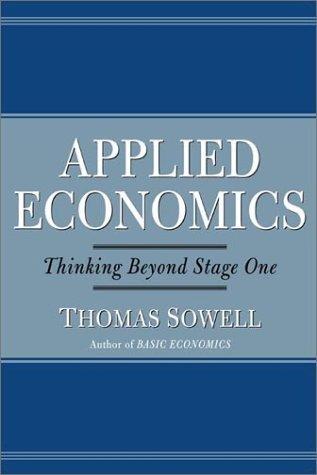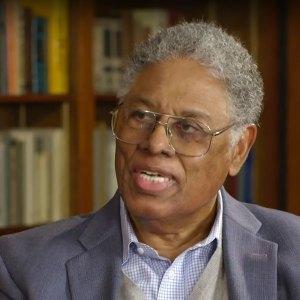Applied Economics Summary
7 min read ⌚
 Thinking Beyond Stage One
Thinking Beyond Stage One
Should politicians meddle with the economy?
And is economics truly “the dismal science”?
Thomas Sowell tries to answer these questions by thinking beyond stage one in his exceptionally well received “Applied Economics.”
Who Should Read “Applied Economics”? And Why?
Whether you like it or not, economics and politics affect you personally.
And, regardless of whether you’ll agree with its conclusions or think they are a bit stretched, books such as “Applied Economics” are a breath of fresh air, both for their simplicity and for their uncompromising attitude.
In other words, “Applied Economics” is not about experts, but about the general public, and especially for disinterested voters who’ should profit a lot from learning more about the relationship between politics and economics.
 About Thomas Sowell
About Thomas Sowell
Thomas Sowell is an American economist and the Rose and Milton Friedman Senior Fellow on Public Policy at the Hoover Institution at Stanford University.
After dropping out of high school to serve in the United States Marine Corps during the Korean War, Sowell went on to graduate magna cum laude from Harvard University, a decade before obtaining a doctorate in economics from the University of Chicago.
He has taught at several universities and has written numerous articles and more than thirty books. His “Basic Economics” is considered a classic.
“Applied Economics PDF Summary”
According to 19th-century Scottish writer and philosopher Thomas Carlyle, as opposed to the gay science of verse-writing, economics was a “dismal science.”
Thomas Sowell, an economist, agrees with Carlyle.
And, believe it or not, for the exact same reason!
Namely, because – as Carlyle writes in “Occasional Discourse on the Negro Question” – economics “finds the secret of this Universe in ‘supply and demand,’ and reduces the duty of human governors to that of letting men alone.”
But, here’s the kicker:
Sowell thinks that this is great and that, in fact, the very abject nature of economics is its most wonderful attribute!
Why?
Well, we’ve already told you how “the universe is under no obligation to make sense to you;” but, if you remember well enough, you already know that, even so, Neil deGrasse Tyson sees beauty and power in its laws because “they apply everywhere, whether or not you choose to believe in them.”
In the opinion of Thomas Sowell, the same is true in economics as well.
It is the science of the cold, hard facts of life: when supply is low and demand is great, prices rise; when supply exceeds demand, prices fall; in the absence of an economic incentive, people tend to; in its presence – they.
It may be dismal – or even anticlimactic – to say that this is one of the secrets of the Universe, but it is – whether you like it or not, the same way 2+2=4.
In a nutshell, economics thinks of the world logically, in terms of the way it actually works. It believes that there are predictable consequences of people’s actions and that, in the long run, there’s no running away from some outcomes.
As opposed to economics, politics thinks about the world emotionally, in terms of the way it fantasizes the world should look like. It’s a short-term anything-can-happen mode of thinking which multiplies problems while trying to solve them:
Political thinking tends to conceive of policies, institutions or programs in terms of their hoped-for results – ’drug prevention’ programs, ’profit-making’ enterprise, ’public-interest’ law firms, ’gun control’ laws, and so forth.
Sowell speaks from his own experience.
While an undergraduate studying economics under Professor Arthur Smithies of Harvard, he was in class one day what policy he favored “on a particular issue of the times.”
Sowell proceeded to answer him with enthusiasm, explaining the beneficial consequences of the policy he advocated.
“And then what will happen?”, his professor asked.
This question caught Sowell off guard, but he managed to find a satisfying answer. But when his professor persisted with the same question and Sowell got further and further in the future analyzing the economic consequences of his policy, he realized “that the economic reverberations of the policy [he] advocated were likely to be pretty disastrous — and, in fact, much worse than the initial situation that it was designed to improve.”
The point?
Simple as this little exercise might seem, it went further than most economic discussions about policies on a wide range of issues. Most thinking stops at stage one.
Sowell’s book is rife with examples how seemingly beneficial policies are in fact beneficial only superficially – that is, at stage one.
In the long run – stages 2, 3, 4, etc. – the very fact that the government has chosen to interfere with the free markets inevitably results in economic consequences which undermine the very cause the government policies have initially attempted to advance.
We’ll look at one more specific example from the book in the “Key Lessons” section, but here’s, for now, one simplified general analysis so that you can understand how politics messes up economics 99 out of 100 times.
Problem: There’s not enough money for education.
Solution: Take it from private businesses.
Stage 1: Raise taxes. Year one: there is more money for education, and more and more students are capable of going to college.
Stage 2: Year two: corporations on the edge of profitability go bust. Other corporations start relocating to escape the same destiny.
Stage 3: There are no new businesses during the following two or three years since everybody wants to pay as little taxes as possible.
Stage 4: The happy students who profited from the policy at Stage 1 have graduated from college by now; in vain: no one is hiring, and they are unable to find any kind of job, let alone a suitable one.
Stage 5: There’s a new government now and, in addition to the unemployment, they are also faced with a budgetary problem (fewer companies, less money in the budget).
Stage 6: The new government proposes – wait for it… – a tax increase.
There’s an adjective which describes this circuitous logic.
And it’s “vicious” for a sound reason.
Key Lessons from “Applied Economics”
1. Economics vs. Politics = Logic vs. Fantasy
2. The Short-Sightedness of Politicians and California’s Electricity Problem
3. Governments, Leave the Free Markets Alone!
Economics vs. Politics = Logic vs. Fantasy
Economics and politics are not exactly Butch Cassidy and the Sundance Kid; in the opinion of Thomas Sowell – the analogy is, of course, ours – they are much more akin to the pairing of Sancho Panza and Don Quixote, without the funny bits or the relatively happy ending.
In other words, economics is down-to-earth, logical, and factual; the head of politics is always in the clouds: it is idealistic, fantastical, unscientific.
Basic supply-side economics may be a dismal science, but it’s the way the world works, so economics is able to people’s behavior in the long run. Politics is much more hopeful mainly because it has nothing to do with reality.
Which is why it always messes things up.
The Short-Sightedness of Politicians and California’s Electricity Problem
When thinking about real-world problems, politicians are always stuck at Stage 1 – they never ask “what then?” when they propose a solution.
A good real-world example is the California electricity crisis of 2000 and 2001.
When California’s politicians decided that the electric prices were too high, they lobbied for votes to regulate them; and, obviously, they got enough of them to cap the price at a maximum of seven cents a kilowatt-hour.
However, as it turned out, the prices went up for a reason: due to reduced rainfall and higher hydrocarbon prices, utilities actually needed 15 cents to generate one kilowatt-hour for electricity.
So, they started shutting down their facilities, and California started experiencing blackouts and power shortages.
In the end, the government had to buy electricity and, of course, it paid with the money of the people.
So, in the end, the people actually paid more than they would have if the state didn’t try to regulate the prices in the first place!
Governments, Leave the Free Markets Alone!
Even though some respected economists such as Paul Krugman believe that conservative libertarian supply-side economics is “a crank doctrine,” Thomas Sowell thinks – with, say, Hayek and Friedman – that it is a fact of life.
In other words, that there’s no other way to organize an economy but by regulating it as little as possible and letting the free market decide what people need and how much of it they should be supplied with.
A simple, but a powerful equation.
Like this summary? We’d like to invite you to download our free 12 min app, for more amazing summaries and audiobooks.
“Applied Economics Quotes”
Families, gangs, feudal warlords, insurance companies, partnerships, commodity speculators, and issuers of stocks and bonds are all in the business of reducing and transferring risk. Share on X
For purposes of economic analysis, what matters is not what goals are being sought but what incentives and constraints are being created in pursuit of those goals. Share on X
As markets replaced politically managed economic decision-making, China experienced one of the highest economic growth rates in the world. Share on X
The advantages of a free labor market benefit not only the worker but also the economy. Share on X
Given the low educational levels of many who become career criminals, crime may well be their best-paying option. Share on X
Our Critical Review
“Applied Economics” is a bit one-sided, and, at times – and as a consequence – too simplified analysis of how economic processes work in the real world.
However, it’s also an easy-to-understand read with many good points.
Conservatives will adore it.
Others should read it since it’s too thought-provoking to be ignored.
Emir is the Head of Marketing at 12min. In his spare time, he loves to meditate and play soccer.


 Thinking Beyond Stage One
Thinking Beyond Stage One About Thomas Sowell
About Thomas Sowell




